| Listing 1 - 10 of 21 | << page >> |
Sort by
|
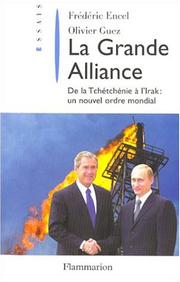
ISBN: 2082102815 9782082102810 Year: 2003 Publisher: Paris : Flammarion,
Abstract | Keywords | Export | Availability | Bookmark
 Loading...
Loading...Choose an application
- Reference Manager
- EndNote
- RefWorks (Direct export to RefWorks)
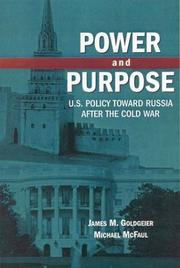
ISBN: 0815731736 0815731744 Year: 2003 Publisher: Washington (D.C.) : Brookings institution,
Abstract | Keywords | Export | Availability | Bookmark
 Loading...
Loading...Choose an application
- Reference Manager
- EndNote
- RefWorks (Direct export to RefWorks)
This work traces the formulation and evolution of American foreign policy toward the Soviet Union and Russia during the tumultuous and uncertain decade at the end of the Cold War. It examines how American decision-makers coped with opportunities and challenges presented by a new Russia.
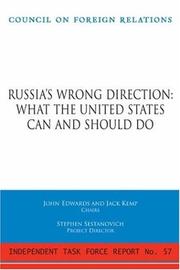
ISBN: 0876093527 9780876093528 Year: 2006 Volume: 57 Publisher: New York (N.Y.) Council on Foreign Relations
Abstract | Keywords | Export | Availability | Bookmark
 Loading...
Loading...Choose an application
- Reference Manager
- EndNote
- RefWorks (Direct export to RefWorks)
United States --- Russia (Federation) --- Foreign relations --- Politics and government --- Economic policy --- United States - Foreign relations - Russia (Federation) --- Russia (Federation) - Foreign relations - United States --- Russia (Federation) - Politics and government --- Russia (Federation) - Economic policy
Book
ISBN: 0226431436 9780226431437 Year: 1951 Publisher: London University of Chicago Press
Abstract | Keywords | Export | Availability | Bookmark
 Loading...
Loading...Choose an application
- Reference Manager
- EndNote
- RefWorks (Direct export to RefWorks)
Russia --- United States --- Soviet Union --- Foreign relations --- Russia - Foreign relations - United States --- United States - Foreign relations - Russia --- United States - Foreign relations - 20th century --- United States - Foreign relations - Soviet Union --- Soviet Union - Foreign relations - United States
Book
ISBN: 2080800965 9782080800961 Year: 2004 Volume: 563 Publisher: Paris : Flammarion,
Abstract | Keywords | Export | Availability | Bookmark
 Loading...
Loading...Choose an application
- Reference Manager
- EndNote
- RefWorks (Direct export to RefWorks)
World politics --- Politique mondiale --- United States --- Russia --- Etats-Unis --- Russie --- Foreign relations --- Relations extérieures --- Russia (Federation) --- Russia (Federation) - Foreign relations - United States --- United States - Foreign relations - Russia (Federation)
Book
ISBN: 9781509501892 9781509501885 1509501886 1509501894 Year: 2016 Publisher: Malden, MA : Polity,
Abstract | Keywords | Export | Availability | Bookmark
 Loading...
Loading...Choose an application
- Reference Manager
- EndNote
- RefWorks (Direct export to RefWorks)
"The 2014 crisis in Ukraine sent a tottering U.S.-Russian relationship over a cliff - a dangerous descent into deep mistrust, severed ties, and potential confrontation reminiscent of the Cold War period. In this incisive new analysis, leading expert on Soviet and Russian foreign policy, Robert Legvold, explores in detail this qualitatively new phase in a relationship that has alternated between hope and disappointment for much of the past two decades. Tracing the long and tortured path leading to this critical juncture, he contends that the recent deterioration of Russia-U.S. relations deserves to be understood as a return to cold war with great and lasting consequences. In drawing out the commonalities between the original cold war and the current confrontation, Return to Cold War brings a fresh perspective to what is happening between the two countries, its broader significance beyond the immediate issues of the day, and how political leaders in both countries might adjust their approaches in order, as the author urges, to make this new cold war "as short and shallow as possible."--
Cold War --- Security, International --- Guerre froide --- Sécurité internationale --- United States --- Russia (Federation) --- Etats-Unis --- Russie --- Foreign relations --- Relations extérieures --- Security, Interntional --- Security, InterntionalUnited States --- United StatesForeign relations --- Sécurité internationale --- Relations extérieures --- Security, International - 21st century --- United States - Foreign relations - Russia (Federation) --- Russia (Federation) - Foreign relations - United States --- United States - Foreign relations - 1989 --- -Cold War
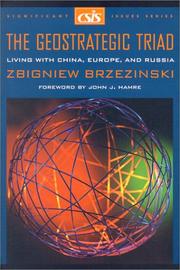
ISSN: 07367136 ISBN: 089206384X 9780892063840 Year: 2001 Volume: 23, no. 1 Publisher: Washington Center for strategic and international studies
Abstract | Keywords | Export | Availability | Bookmark
 Loading...
Loading...Choose an application
- Reference Manager
- EndNote
- RefWorks (Direct export to RefWorks)
United States --- China --- Europe --- Russia (Federation) --- Foreign relations --- 876 Veiligheidspolitiek --- United States - Foreign relations - China --- China - Foreign relations - United States --- United States - Foreign relations - Europe --- Europe - Foreign relations - United States --- United States - Foreign relations - Russia (Federation) --- Russia (Federation) - Foreign relations - United States --- United States - Foreign relations - 1989 --- -876 Veiligheidspolitiek --- -United States - Foreign relations - China --- -China
Book
ISBN: 9780190058838 9780197528969 0190058838 0197528961 Year: 2020 Publisher: New York, N.Y. Oxford University Press
Abstract | Keywords | Export | Availability | Bookmark
 Loading...
Loading...Choose an application
- Reference Manager
- EndNote
- RefWorks (Direct export to RefWorks)
"Imagine a strategy memo forecasting cyberattacks by Russian hackers, trolls, and bots designed to roil social discontent and damage the electoral prospects of a major party US presidential nominee, or, if she winds up winning, to sabotage her ability to govern by seeding allegations of Democratic voter fraud. Guaranteed payoff. No fingerprints. No keystroke record. No contrails in the cloud. To ensure that Americans would believe that disparaging messages about her were made in the US, use bitcoin to buy space and set up virtual private networks (VPNs) on American servers. Distribute hacked content stolen from the accounts of her staff and associates through an intermediary, WikiLeaks. Use identity theft, stolen Social Security numbers, and appropriated IDs to circumvent Facebook and PayPal's demand for actual names, birth dates, and addresses. On platforms such as Instagram and Twitter, register under assumed names. Diffuse and amplify your attack and advocacy through posts on Facebook, tweets and retweets on Twitter, videos on YouTube, reporting and commentary on RT, blogging on Tumblr, news sharing on Reddit, and viral memes and jokes on 9GAG. Add to the mix a video game called Hilltendo in which a missile-straddling Clinton figure vaporizes classified emails sought by the FBI. Employ "online agitators" and bots to upvote posts from imposter websites such as BlackMattersUS.com to the top of such subreddits as r/The_Donald and r/HillaryForPrison. Drive content to trend. To maximize the impact of your handiwork, use data analytics and search-engine maximization tools built into the social media platforms. To test and fuel doubts about the security of US voter information, hack the election systems of states. And, throughout the primary and general election season, insinuate the notion that if Hillary Clinton were to win, she would have done so by rigging the election, an outcome that would repay her assaults on the legitimacy of their leader's presidency with doubts about her own. Were she instead to lose, she would no longer be a thistle in the toned torso of the hackers and trolls' boss's likely boss. Every result but one produces desirable results for the Kremlin. Outcome one: Clinton is off the international stage. Outcome two: she wins but can't govern effectively. Outcome three: the former Secretary of State is elected and the country simply moves on, but the sabotage nonetheless has magnified cultural tensions and functioned as a pilot from which to birth later success - perhaps when she runs for a second term. The only eventuality that damages the Russian cybersoldiers and their commander-in-chief is the fourth in which, in real time, the cyberattackers are unmasked by a vigilant intelligence community, condemned by those in both major political parties and around the world, characterized by the media as spies and saboteurs, the Russian messaging is blocked or labeled as Russian propaganda, and, when included in media accounts, the stolen content is relentlessly tied to its Russian origins and sources. None of that happened. Instead, to the surprise of the Russian masterminds as well as both Hillary Clinton and Donald Trump, he won the Electoral College and with it a four-year claim on 1600 Pennsylvania Avenue. Although countrywide she bested him by almost 2.9 million votes, he unexpectedly captured an Electoral College majority by running the table. By the end of the evening of November 8, Florida as well as Wisconsin, Michigan, and Pennsylvania were in his column. The ways in which Russian hacking and social media messaging altered the content of the electoral dialogue and contributed to Donald Trump's victory are the subjects of this book. To begin my exploration, this overview chapter will highlight key findings of the US intelligence community; preview my focus on the hackers and trolls and the synergies between them; justify casting the Russian machinations as acts of cyberwar; outline ways in which susceptibilities in our system of government and media structures magnified their effects; and note five presuppositions that will shape my analysis of the Russian trolls' work and one that will guide my study of the effects of the hackers."--
Political sociology --- Polemology --- Mass communications --- anno 2010-2019 --- Russia --- United States --- Presidents --- Elections --- Election --- Corrupt practices --- Trump, Donald, --- Russia (Federation) --- Foreign relations --- Presidents - United States - Election - 2016. --- Elections - Corrupt practices - United States. --- Trump, Donald, - 1946 --- -Russia (Federation) - Foreign relations - United States. --- United States - Foreign relations - Russia (Federation) --- United States of America --- -Russia (Federation)
Book
ISBN: 2729817328 9782729817329 Year: 2003 Publisher: Paris : Ellipses,
Abstract | Keywords | Export | Availability | Bookmark
 Loading...
Loading...Choose an application
- Reference Manager
- EndNote
- RefWorks (Direct export to RefWorks)
Don Nahum
Geopolitics --- World politics --- Great powers --- Géopolitique --- Politique mondiale --- Grandes puissances --- History --- Histoire --- United States --- Etats-Unis --- Foreign relations --- Relations extérieures --- Soviet Union --- Russia (Federation) --- China --- Histoire militaire --- USA Etats-Unis d'Amérique --- Géopolitique --- Relations extérieures --- USA --- Asia --- United States - Foreign relations --- United States - Foreign relations - Soviet Union --- Soviet Union - Foreign relations - United States --- United States - Foreign relations - Russia (Federation) --- Russia (Federation) - Foreign relations - United States --- United States - Foreign relations - China --- China - Foreign relations - United States
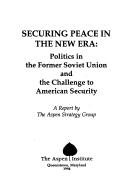
ISBN: 089843159X 9780898431599 Year: 1994 Publisher: Queenstown Aspen institute
Abstract | Keywords | Export | Availability | Bookmark
 Loading...
Loading...Choose an application
- Reference Manager
- EndNote
- RefWorks (Direct export to RefWorks)
National security --- United States --- Russia (Federation) --- Former Soviet republics --- Foreign relations --- Economic conditions --- Economic conditions. --- Politics and government --- Politics and government. --- 327.51 --- National security - United States. --- United States - Foreign relations - Russia (Federation) --- Russia (Federation) - Foreign relations - United States. --- United States - Foreign relations - Former Soviet republics. --- Former Soviet republics - Foreign relations - United States. --- Russia (Federation) - Economic conditions - 1991 --- -Former Soviet republics - Economic conditions. --- Russia (Federation) - Politics and government - 1991 --- -Former Soviet republics - Politics and government.
| Listing 1 - 10 of 21 | << page >> |
Sort by
|

 Search
Search Feedback
Feedback About UniCat
About UniCat  Help
Help News
News